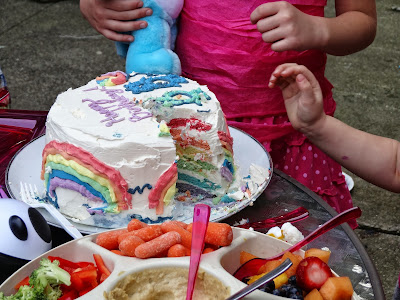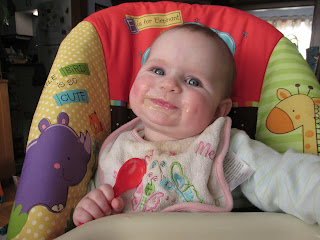 |
| Two completely different five year olds |
If I hadn't been running after a two year old who was Hell bent on throwing herself in front of a car in the preschool drop-off line, I'd have given another mom my craziest crazy eyes.
Surely, she had to be kidding.
It cannot be that difficult to distinguish my children from each other.
It is, in fact, so easy that all three of my children have ready-made answers to this question, for whenever they hear somebody ask.
"How do you tell them apart?"
If I had the time, I would TELL each person who asked this.
I'd say SI is two full inches taller, that she has blue eyes and dark brown hair, that she has pale eyebrows and an elegant neck. That she looks dainty and elfish with her rounded lips and ears that stick out a bit from her head.
I'd say DD has olive skin, and hair only a few shades darker when the sun has tanned and highlighted all summer. That she has a squared smile and small, perfectly even teeth, that her eyes are green and her nose both rounded and cleft. That she has no earlobes, and her much longer curls are so thick and kinky as to be obviously "ethnic."
I'd say SI has loose, soft curls, and cheekbones for miles. And that DD has the Hapsburg chin dark and, heavy eyebrows.
I'd say SI has a little beauty mark on her forehead, and DD has one on her cheekbone that Marilyn Monroe would KILL for. That SI's feet are a whole size and a half larger than DD's, and that she chews her fingernails but DD doesn't.
I could catalogue each feature, and tell you which of the many branches of their family tree provided it, and that there are almost no commonalities.
They are both five year old girls with curly brown hair, but the similarities begin and end there.
SI, with the same lips as M's sister, my great-grandfather's ears, my mother's hair, my wonky little toes.
DD, with my younger sister's smile, my father's eyebrows, my older sister's hair, M's dimple.
How do I tell them apart?
It can't just be that I'm their mother. That I've seen them on all but about twelve of their roughly 2,000 days on this earth. It can't just be that I have some sort of superpower that enables me to see them as individuals, as unique from each other in every way.
I have always worried for them, my twins, who will be lumped together as a unit no matter what they do, because they are twins.
I have always worried that their identities will be so caught up in what people expect of them as twins that they are afraid to find out who they are alone.
I would ask anyone who asks me, "How do I tell them apart?" "Have you seen them?"
Look at each of their features. Just look. Even bundled up in their coats- one in all pinks and the other with bold blue and yellow stripes- with nothing to work from but their eyes and noses and the strands of hair that work their way out from under their hoods. And find one- a single one- that is the same from child to child.
Listen to them speak. DD's wet "j" and "ch" sounds, her overly pronounced vowels that sound British in their accent, with words like "school" lengthened to two syllables.
SI's muddled vowels, and her intense sarcasm as she answers statements of the obvious with, "Are you KIDDING me?!"
Listen to their laughs, DD's open and wild shrieks, SI's hysterical giggles and guffaws.
Even if their faces were identical. Even if they matched from the tops of their curls to the crescents of their toenails, I could still tell them apart.
Because they are not the same people.
They are unique and fascinating, they have separate interests and likes and dislikes, and they express themselves in their own ways.
They are not, in any way, the same. Not in the way they eat their dinner, not in the way they kiss me goodnight.
If I were blind I could tell them apart.
If I were deaf I could tell them apart.
If I were given no indication but the feel of their hand in mine, I would know who's hand I was holding.
They are twins, but that does not mean they are the same. That doesn't even mean they are a pair. They are siblings with the same birthday, but being twins does not and should not eclipse their identity.
Strangers ask me how to tell them apart, as though being twins makes them a completed set. As though there must be an answer to the question because there must be some problem distinguishing their individual identities in the first place.
"How do you tell them apart?"
"Just ask them," I sometimes say.
They know how to answer.
"I'm SI," SI says.
"And I'm DD!" DD replies.
"That is my sister SI, and that is my sister DD," RH adds, as though to settle the matter.
That should be enough for anyone.















































